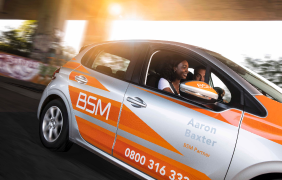BSM’s New Year’s plea to young drivers and passengers

- Research shows many young drivers will not try to stop drunk or drugged friends from driving
- Call from driving school BSM for young drivers to follow five steps to stay safe this New Year’s Eve
Young drivers are being urged to keep themselves and their friends safe this New Year’s Eve after research shows only six out of ten would definitely try to persuade a drunk friend not to drive.
The research*, compiled for driving school BSM, showed only 59% of young drivers would definitely try to persuade a drunk friend not to drive. Slightly fewer (54%) would definitely try to persuade a friend who had taken an illegal drug not to drive.
More than one in twenty (7 per cent) young drivers would definitely not, or be unlikely to, try to persuade a friend not to drink drive.
Different regions showed varying levels of those young drivers who said they definitely would try to stop a friend from driving who was over legal alcohol limit. Wales had the highest number (77%) who said they would definitely try to, compared to Northern Ireland, which had the lowest at just 40%.**
A gender split was also evident with just over one in ten (11%) young male drivers saying they definitely would not, or be quite or very unlikely to, try to persuade a drunk friend not to drive. This fell to almost one in twenty (7%) for women.
Women were also far more likely (64%) than men (52%) to say they would definitely try to persuade a friend not to drive after drinking.
The research also looked at car accidents the young drivers had been involved in, either as a driver or passenger in the previous 12 months, and whether or not they thought alcohol or drugs were partly to blame.
Of those who had been involved in a car accident in the previous 12 months as a passenger, 16% said it was at least partly because the driver was over the legal alcohol limit.
More than one in ten (12%) young drivers who had been involved in a car accident in the previous 12 months, said it was at least partly because they were over the legal alcohol limit.
Mark Peacock, head of BSM, said: “We are really urging young drivers to take care of themselves and their friends on the biggest party night of the year.
“The majority of them do have a sensible attitude to keeping themselves and their friends safe and we need to encourage this to spread further in their peer group.
“If you are driving the safest way to ensure you are not over the legal limit is to take a ‘zero tolerance’ policy and stay away form alcohol completely.
“Even if you are not driving, you can help keep safe by encouraging any friends who are driving not to drink and making sure you do not get into the car with a driver who is drunk or who has taken an illegal substance.
“No one wants to start the New Year with points on their licence, a fine or worse still, an accident and injuries.”
With New Year’s Eve a traditional party night, BSM is calling on young drivers to look after themselves, and their friends, by:
- Not getting into a car with a driver they know to be over the legal alcohol limit or who has taken an illegal substance.
- Looking after their friends – if you know someone is over the limit or has taken an illegal drug try to persuade them not to drive. Peer pressure can be used positively.
- Adopting a ‘zero tolerance’ position by not drinking any alcohol if they will be driving.
- Not taking any illegal drugs if they will be driving.
- Organising a designated driver or pre-booking a licensed taxi for New Year’s Eve.
ENDS
Media contact 01256 495969
* Online survey by OnePoll on behalf of BSM of 1,000 UK drivers aged 17-24 between 21st June 2012 and 29th June 2012.
** Full regional breakdown as follows of those who answered “definitely would” to the following question:
If you knew one of your friends was about to drive after drinking over the legal limit of alcohol, how likely would you be to try to persuade them not to drive?
East Anglia – 58%
East Midlands – 44%
London – 48%
North East – 72%
North West – 55%
Northern Ireland – 40%
Scotland – 71%
South East – 60%
South West – 67%
Wales – 77%
West Midlands – 50%
Yorkshire and Humberside – 65%
Featured posts

Dealing with roundabouts as a learner driver
How to handle busy roundabouts Learning to drive can evoke a mixture of emotions. Excitement, eagerness, pride, apprehension, nervousness, even dread. Most of the time, getting behind the wheel dur

Bionic Driving Instructor Back Behind the Wheel
Durham driving instructor has launched new business following successful recovery from major operation A driving instructor is back behind the wheel of a new business following a total hip replac

Mum vs Dad vs Jenson Button
Forget being taught to drive by mum or dad – these days children and teens would rather a professional instructor or Formula 1 racing driver showed them the ropes. Research*, by driving school B

Hazard Perception Test Changes 2018
Hazard Perception Test Changes Learning to drive is an exciting part of your life and quite a transformation of your lifestyle once finished, enabling freedom and a sense of independence. So it goes